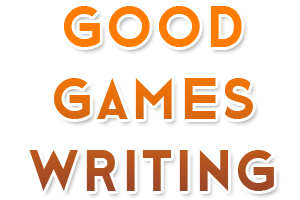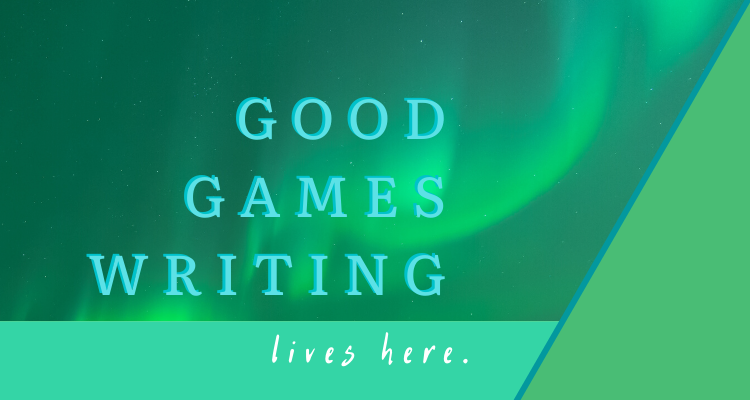The best games writing from around the web.
The Weekly is your round-up of all the best in games writing and related spaces. Reviews, news, features, and more await you each week as the curators of Good Games Writing scour the Internet for the best of the best. Some themes are for older audiences.
A time change means one less hour to enjoy March 14th. Here, the sun is shining and the birds are singing, a sure sign that spring is on our doorstep. The time change also brings challenges to our sleep cycles–as if a global pandemic weren’t challenge enough–ushering in a week we always struggle to manage. Such a week cannot derail your work; we know it’ll be a week like any other, filled to the brim with excellent writing. This week, though, there might be a little more sunshine.
REVIEWS
We’re fans of the recent rise of short reviews. WALL JUMP‘s reviews capture brief moments in games and we enjoyed this one on If Found. It says enough to tell you if this is the game for you, capturing the game’s poignancy while avoiding spoiling any of the game’s finer moments.
Early modern medicine and astrology blend together in Emily Price’s Astrologaster review. There’s a helpful dose of history thrown in for good measure.
Loop Hero is the new hotness taking over social media (and our attention spans) so it’s no surprise we’ve been drawn to writing on it. We’ll start with Anthony McGlynn’s review which is the most direct and helpful explanation of the game we’ve read so far.
We then arrive at Kat Bailey’s review, aimed squarely at dedicated RPG and roguelike fans, a review that knows both about systems and narratives.
Then there’s Jordan Oloman’s review/interview hybrid (let’s call it a feature) on the game: It’s tailor-made for those of you who haven’t bitten on the hype just yet, those who play compulsively, and those who just want to bop along with the soundtrack. That interview? It’s with the game’s composer and it adds just enough to the piece to fit NME’s particular niche.
& CRITICISM
Andrew King takes six paragraphs to introduce the subject proper—Umurangi Generation’s Macro DLC–as both the piece and the DLC skewer right-wing propaganda machines.
But, if Umurangi Generation’s PragerU equivalent, Liberty Inc., is to be believed, the end of the world isn’t all that bad. In Gamers Palace, side by side with the escapist VR, videos of smug propagandists play, each arguing that the end of the world as we know it isn’t the end of the world as we know it.
At Into the Spine, Emma Kostopolus reminds us that just because a game is ‘cute’, doesn’t mean it gets a pass from criticism. In this case, that criticism is leveled both at a system (breeding slimes) and the implicit imagery that it brings (surrounding keeping pure bloodlines).
City-builders and related genres aren’t successfully contending with concerns around pollution, enhanced climate change, or environmentalism writ large in Luke Shaw’s latest. When efficiency is what’s rewarded, these games lead to a series of min-maxing decisions that encourage the harvest of raw resources, not at all unlike what’s happening on our planet right now. “Functionally unlimited” resources don’t abound on Earth. Shaw points out these games attempt to manage pollution but the consequences are, well, read on:
Factorio does feature a pollution mechanic that punishes the player by sending swarms of aliens after their precious constructions. However, the player can either contain the pollution or outfit their base with enough firepower to repel the attacks. If anything, this approach leans even closer to the dynamics of resource exploitation in the real world, except it’s pissed off alien insectoids rather than innocent, displaced populations. It’s pretty wide of the mark, but it’s something.
We always appreciate Access-Ability’s video features and the newest is no exception. In it, microtransactions and the insidious way they target consumers, particularly disabled gamers, is put under the microscope. This is an example that also (thus far) has a comment section worth reading.
REPORTING
Chase Carter interviews Coyote and Crow designer Connor Alexander about the game’s inspirations and systems as the game seeks funding on Kickstarter. The game promises to place an “emphasis on decolonising traditional assumptions about how RPG stories should play out”.
Blaseball is still one of the most intriguing experiences in and around gaming. As its new season gets underway, IGN‘s Rebekah Valentine chats with the developers, creating an effective rundown of the game, one that reminds us the role the community and its lore plays.
Stephen Bell, another one of The Game Band, adds, “What do people maybe need to know, to jump into the new era from what happened before? Basically, there was a baseball league, and then the fans voted to open the Forbidden Book. And then, like 11 seasons later, they killed God. There’s stuff in between, but that’s where we’ve left off.”
At Metro, Deadly Premonition creator Hidetaka ‘SWERY’ Suehiro is interviewed about upcoming release The Good Life, and there’s plenty of interesting tidbits, particularly for critics and reviewers.
Keith Stuart blends literary analysis with a gaming-centric interview with author Raven Leilani. The interview touches on her gaming experiences and how they influence the narrative she writes and the unique vulnerability found in games.
Luster is filled with beautiful, intricate observations – she places brand names, specific disco songs and other cultural artefacts with the exactness of an artist setting up a still life painting. This, she says, is something she learned from RPGs. “You follow a character on this journey of self-discovery, and I like the work that it entails. I like going into villagers’ houses and finding what’s there, I like talking to NPCs and exhausting my options. I love being rewarded for that attention and rigour … It’s hard to articulate the magic of a world that responds to you in that way.
Wooden sets, paintings, and puppets are often at the heart of Jiří Barta’s films. Those films and their aesthetic serve as inspiration for the design of games like Creaks that use “puppetry to bring energy and agency to an assortment of lifeless objects” according to Ewan Wilson. The piece, incidentally, pairs well with this piece on the developers who use live action in games, a sprawling read well worth the time.
Our read of the week goes to Nicole Carpenter. Reporting on Neopets‘ long-standing black market, Carpenter digs into that underground economy, particularly the one surrounding “unconverted pets”. The piece is part Neopets crash course, part economics primer, and all quality reporting. The position of the Neopets team is an untenable one in which few leave happy.
THREADS
This section recognizes discussions that emerge through the week. We only feature it when we see trends that emerge and discussions arise. This week, three pieces made us think about our relationship with our games, all in different ways.
First is Erik Twice who considers the role of so-called “alpha players” in co-op tabletop games. Players choosing not to engage in toxicity can help manage this; so, too, can intentional game design. *Strong language warning*
Then, there’s Kieran Harris’ argument that online trophies should be scrapped from games. Who has time to be #1 on the worldwide leaderboards of a game?
Finally, Swapna Krishna reminds us that it’s OK to drop a game that’s no longer entertaining you (or bringing you pleasure).
USUAL SUSPECTS
Our Usual Suspects section is for the games we find ourselves talking about at every turn.
This week that includes The Witcher 3, Mass Effect, and Final Fantasy.
On The Witcher front, Jessica Howard provides a helpful timeline of the series’ happenings, creating a handy bullet-point list of key details. Nice.
Yussef Cole reflects on his time with Final Fantasy XIII and finds a game that is filled with a “color cast of heroes” but also “chunks of bland, repetitive battles”. To play such a game is all too often to enter a period of self-isolation, Cole writes, an experience that doesn’t hold up when compared to the richness of life outside the game’s world.
Kenneth Shepard, meanwhile, appreciates the way Bioware evolved in its approach to dialogue, adding icons to convey certain meanings.
This categorization of spoken words isn’t exclusive to romance. These games assign tone to every response you’re allowed to give, whether that be humorous, emotional, or stoic. The understanding that comes from these little pieces of art at the center of a dialogue wheel have become key tools in roleplaying a character.
Worth Reading:
Briefly, two other pieces worth reading, one of a game that may well become a “usual suspect” for all the wrong reasons, while the other is of a game that was, once upon a time, regularly covered ad nauseum.
- Imran Khan doesn’t pull any punches with respect to the creators of Six Days in Fallujah. “They’re asking you not to believe what you see or what you hear and telling you that they know better.”
- Jordan Oloman jumped back into Call of Duty: Modern Warfare 2’s multiplayer and found a dedicated player-base and a lot of fun. This piece is pure gold from end to end.
JOBS
We spied only one new job this week and it’s for a website editor at PocketGamer.biz.
Polygon re-upped its pitching guide. It’s always worth a look. Mind which email you send what to and don’t forget to include the relevant information in the subject line.
Keith Stuart posted a primer to getting into games writing on his Substack. It’s worth a peek.
That’s it for this week’s update. If you’ve seen any good games writing let us know. Ditto for jobs and pitch requests! We’d love to share it!
Quick Hits:
Bailey, Kat. “Loop Hero taps into the deepest parts of RPG history” (RPS: March 10, 2021) <www.rockpapershotgun.com/loop-hero-taps-into-the-deepest-parts-of-rpg-history>.
Carpenter, Nicole. “Neopets is reckoning with black market pet trading” (Polygon: March 8, 2021) <www.polygon.com/22319750/neopets-uc-pets-trading-black-market>.
Carter, Chase. “RPG Coyote and Crow’s indigenous-led design team has created a tabletop world beyond the colonised mindset” (Dicebreaker: March 8, 2021) <www.dicebreaker.com/games/coyote-and-crow/news/coyote-crow-indigenous-rpg-kickstarter>.
Cole, Yussef. “Digital Distractions” (Unwinnable: March 8, 2021) <unwinnable.com/2021/03/08/digital-distractions/>.
Harris, Kieran. “Why online trophies and achievements should be scrapped” (The Sixth Axis: March 13, 2021) <www.thesixthaxis.com/2021/03/13/why-online-trophies-and-achievements-should-be-scrapped/>.
Howard, Jessica. “‘The Witcher’ Timeline Explained, From the Elder Races to the White Frost” (Collider: March 5, 2021) <collider.com/witcher-timeline-explained/>.
King, Andrew. “Propaganda in the Bunker” (Video Dame: March 10, 2021) <videoda.me/propaganda-in-the-bunker-c92a9de4d767>.
Khan, Imran. “The Creators of Six Days in Fallujah Think We’re Fucking Morons” (Fanbyte: March 8, 2021) <www.fanbyte.com/trending/the-creators-of-six-days-in-fallujah-think-were-fucking-morons/>.
Kostopolus, Emma. “The Peculiar (Dis)comfort of Slime Rancher” (Into the Spine: March 6, 2021) <intothespine.com/2021/03/06/the-peculiar-discomfort-of-slime-rancher/>.
Krishna, Swapna. “Sometimes It’s OK to Give Up” (WIRED: March 10, 2021) <www.wired.com/story/its-ok-to-quit-video-games/>.
McGlynn, Anthony. “Loop Hero Review: Groundhog’s Roguelike” (GameSkinny: March 12, 2021) <www.gameskinny.com/8z5nq/loop-hero-review-groundhogs-roguelike>.
Oloman, Jordan. “‘Loop Hero’ will ruin your life but you really need to play it” (NME: March 12, 2021) <www.nme.com/features/gaming-features/loop-hero-will-ruin-your-life-but-you-really-need-to-play-it-2899026>.
Oloman, Jordan. “Modern Warfare 2 multiplayer on Xbox Series X is just as good as you remember” (NME: March 12, 2021) <www.nme.com/features/gaming-features/modern-warfare-2-multiplayer-on-xbox-series-x-is-just-as-good-as-you-remember-2899024>.
Price, Emily. “‘Astrologaster’ Review: Reach for the Stars” (Fanbyte: March 8, 2021) <www.fanbyte.com/reviews/astrologaster-review-reach-for-the-stars/>.
Redenius, Ingo. “Layer by Layer” (WALL JUMP: March 3, 2021) <wall-jump.com/layer-by-layer/>.
Shaw, Luke. “Industrial strategy games still aren’t dealing with climate change” (PCGamesN: March 10, 2021) <www.pcgamesn.com/factorio/factory-games-climate-change>.
Shepard, Kenneth. “Thank You Bioware For Giving My Gay Ass a Heart Icon to Flirt With” (Fanbyte: March 12, 2021) <www.fanbyte.com/trending/dragon-age-mass-effect-romance-heart-icon/>
Stuart, Keith. “‘I learned about storytelling from Final Fantasy’: novelist Raven Leilani on Luster and video games” (The Guardian: March 11, 2021) <www.theguardian.com/games/2021/mar/11/raven-leilani-luster-video-games-final-fantasy>.
Twice, Erik. “The “alpha player” in coops is a symptom, not the disease” (March 12, 2021) <eriktwice.com/en/2021/03/12/alpha-player-cooperative-games-symptom/>.
Valentine, Rebekah. “What Is Blaseball? Developers Answer as Game Enters New Era” (IGN: March 10, 2021) <www.ign.com/articles/what-is-blaseball-developers-answer-as-game-enters-new-era>.
Weber, Michael. “SWERY’s The Good Life – why Japan’s master of jank swapped suburban US for rural England” (Metro: March 10, 2021) <metro.co.uk/2021/03/10/swerys-the-good-life-why-the-master-of-jank-swapped-the-us-for-uk-14214618/>.
Wilson, Ewan. “Video Game Puppets Have Become a Creepy, Creaky Portal to Empathy” (Fanbyte: March 10, 2021) <www.fanbyte.com/features/video-game-puppets-have-become-a-creepy-creaky-portal-to-empathy/>.

